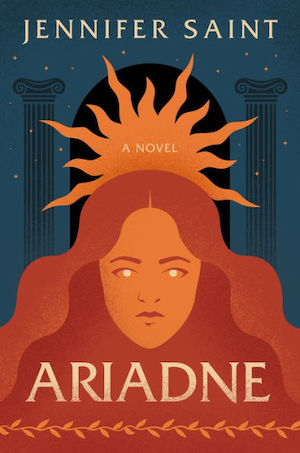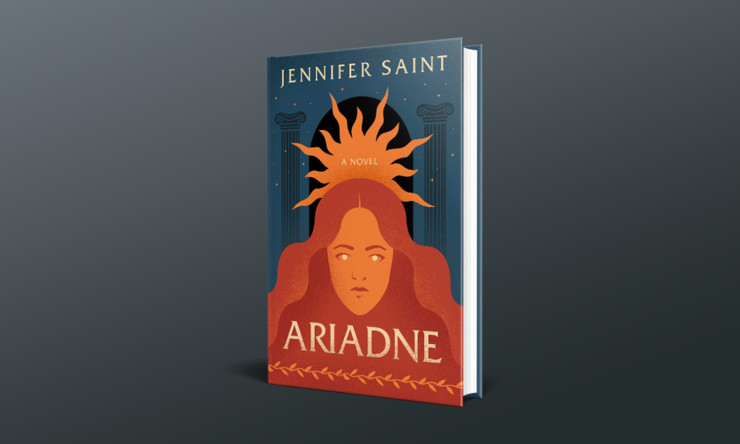Beneath her golden palace echo the ever-present hoofbeats of her brother, the Minotaur…
We’re thrilled to share an excerpt from Jennifer Saint’s debut novel Ariadne, an epic retelling that puts the women of Greek mythology back at the heart of the story—available now from Flatiron Books.
Ariadne, Princess of Crete, grows up greeting the dawn from her beautiful dancing floor and listening to her nursemaid’s stories of gods and heroes. But beneath her golden palace echo the ever-present hoofbeats of her brother, the Minotaur, a monster who demands blood sacrifice.
When Theseus, Prince of Athens, arrives to vanquish the beast, Ariadne sees in his green eyes not a threat but an escape. Defying the gods, betraying her family and country, and risking everything for love, Ariadne helps Theseus kill the Minotaur. But will Ariadne’s decision ensure her happy ending? And what of Phaedra, the beloved younger sister she leaves behind?
The third harvest had indeed come, and this one I would not be allowed to ignore. My father wanted to show off his princess to his newly promised son-in- law. Every year, when the hostages were brought, Crete held funeral games in honor of Androgeos, and this year I was to attend. No more hiding in corners would be permitted. Although several years my junior, Phaedra had prevailed on him to include her as well. My handmaid set a crown upon my head, bound silver sandals to my feet, and robed me in rich blue fabric that fell like water through my fingers. Although the clothes were beautiful, I felt as though they did not belong to me, and I cringed at the prospect of so many eyes being drawn to my finery. I had had quite enough of being stared at and talked about for one lifetime. And so it was that I slunk rather than glided to my seat at the very side of the arena.
Buy the Book


Ariadne
Of course, Cinyras waited for me, already lounging on the cushions heaped up for his comfort. At his elbow was a jug of wine that I gathered he had already drunk deeply of, judging by the reddened flush of his face. I hesitated, looked to where Minos stood at his podium in the center, ready to open the ceremonies. His face flared with satisfaction like a bright coin as he watched my discomfort. My legs moved against my will. I would not let my father see me falter or let him luxuriate in my reluctance. Cinyras smiled lasciviously as I sat, rigid, beside him.
I was grateful for the shade that protected me and sorry for the competitors who would toil beneath the sun’s searing glare. I could hardly make out what was happening in that great golden dazzle, but the buzz of the crowd died away and I heard the panicked snorting and low bellows of the bull, bedecked with garlands, as it was led out before us. Although it rolled its big round eyes and skittered at first, a soft calm descended upon the creature as it approached the altar. I’d seen it many times: the peace that soothed an animal on the point of death. It couldn’t see the concealed blade, but, all the same, perhaps it knew its blood would spill for the glory of the gods, and perhaps such a worthy death seemed like a prize. It stepped forward, docile and placid, the rituals were performed, and the knife plunged into its smooth white throat. The blood gleamed in the sunlight as it gushed from the altar. The gods were honored and would smile on our celebrations. The beast’s noble head slumped, the crimson ribbons that decorated its horns lustrous above the thick ruby river that flowed across the stone.
For a moment, I saw the Minotaur pacing in his sunless prison, alone for all the days of every year except tomorrow, and I saw Androgeos, his handsome figure blurred in my memory—my own flesh and blood but truly a stranger to me—gored upon the horns of a different bull. My brothers. Their tragedies alike had led us to this place, the watching crowds and the sacrificial beast that died dumbly in our sight today. Then the other unfortunates who would meet their death tomorrow in the dark—torn apart by the senseless, savage animal I had once thought I could tame.
The games commenced. Men raced on foot and in chariots, tossed spears, hurled the discus, and grappled one another in boxing matches. Sweat poured from the contestants’ temples. A bead trickled down my back. I shifted uncomfortably, wishing it was over. On one side of me, Cinyras drank and cheered, one hand resting damp and heavy on my thigh. I ground my teeth, swallowed my humiliation, tried to shift away, though it only made his fingers clamp more tightly. On my other side, Phaedra was enraptured.
“How much longer will this continue?” I muttered.
She was incredulous at my lack of enthusiasm. “Ariadne, this is the most excitement we ever see!” She tossed her blond head in reproof.
I longed for the solitude of my dancing-floor, wished I was beating out my frustrations on its smooth wooden face. That alone would erase he image of tomorrow—how the lonely Labyrinth would be so briefly enlivened with the chase and the screams and the ripping away of flesh from bones. Then the ship I was to board—the life that awaited me over the waves in Cyprus. I swallowed and forced myself to look at the arena, to distract my mind from its own grim imaginings.
A cloud passed briefly over the sun, and I saw clearly for the first time. “Who’s that?” I asked.
So far, I had recognized many of the young men competing, the preeminent youth of Crete, mainly, all jostling for supremacy. But the youth who stepped forward now to the wrestling ground was not familiar to me at all. Unless . . . I sat forward, scrutinizing his face. I had seen him before—but I could not understand how this could be.
He was tall and broad-shouldered, his strength evident in his easy stance and in the muscles that brought to mind the palace’s finest marble statues. He strode with such confidence and assurance that I was confused as to how he could be a stranger to the place but look so at home.
“Theseus, prince of Athens,” Phaedra whispered to me. It wasn’t just the impossibility of her words: Athens hated us with justified bitterness; why would their prince compete in our games? But something in her tone made me glance at her sharply. She didn’t take her eyes from him as she went on: “He asked Minos directly to take part in the games so he was freed from his bondage for this afternoon only.”
Athens. Freed from his bondage. “You mean, he’s a tribute?” I squeaked disbelievingly. “The prince himself, brought in chains as our sacrifice? Why would Athens send its own prince?”
“He volunteered,” she replied, and this time the dreaminess in her voice was undeniable. “He couldn’t allow the children of his countrymen to come alone, so he took the place of one of them.”
“A fool!” Cinyras snorted.
For a moment, we watched Theseus in silence as I absorbed my sister’s words. Where would one find the courage to do such a thing? I wondered. To cast away a life of riches and power and anything he desired; to give his life in the very prime of his youth for his people. To go knowingly and willingly into the snaking coils of our dungeon as living meat for our monster. I stared at this Theseus, as if by looking hard enough at him I could decipher the thoughts behind that calm face. It must be a mask, I thought, a veneer of ease laid over the frantic racing of his mind. How could anyone not be driven mad by the prospect of what lay just hours ahead of him?
I thought I may have my answer when his opponent stepped out. Taurus, my father’s general, a huge hulking colossus of a man. His sneering face, with its squat, toadlike nose, was as ugly as Theseus’ was beautiful. Veins clustered over his bulging muscles like ropes, glistening horridly with oil. His cruelty was famed across Crete: an arrogant man devoid of sympathy. A brute, barely more civilized than my youngest brother bellowing beneath the stony ground. Perhaps Theseus had weighed things up and preferred to choke to death in Taurus’ deadly grip out here in the light of day than be devoured in the coal-black pit.
They clashed with shocking force. Taurus was far bigger than Theseus, and it seemed he must surely be victorious, but I had underestimated the value of skill against sheer bulk. I didn’t realize how far forward I sat in my seat and how tightly I clenched the wooden bench beneath me until I spotted Phaedra in a similar attitude of fixation and collected myself once more. The two men gripped one another in a horrifying embrace, twisting and striving to throw the other. I could see the sweat in rivers on their backs and the agony carved into every straining muscle. Vast as he was, Taurus’ eyes were beginning to bulge from his head, giving him an expression of crazed disbelief, as, slowly but inexorably, Theseus gained the upper hand and drove him farther and farther to the ground. In an ecstasy of anticipation, we watched, holding our breath so silently that I was sure I could hear the cracking of bones.
Excerpted from Ariadne, copyright © 2021 by Jennifer Saint.










